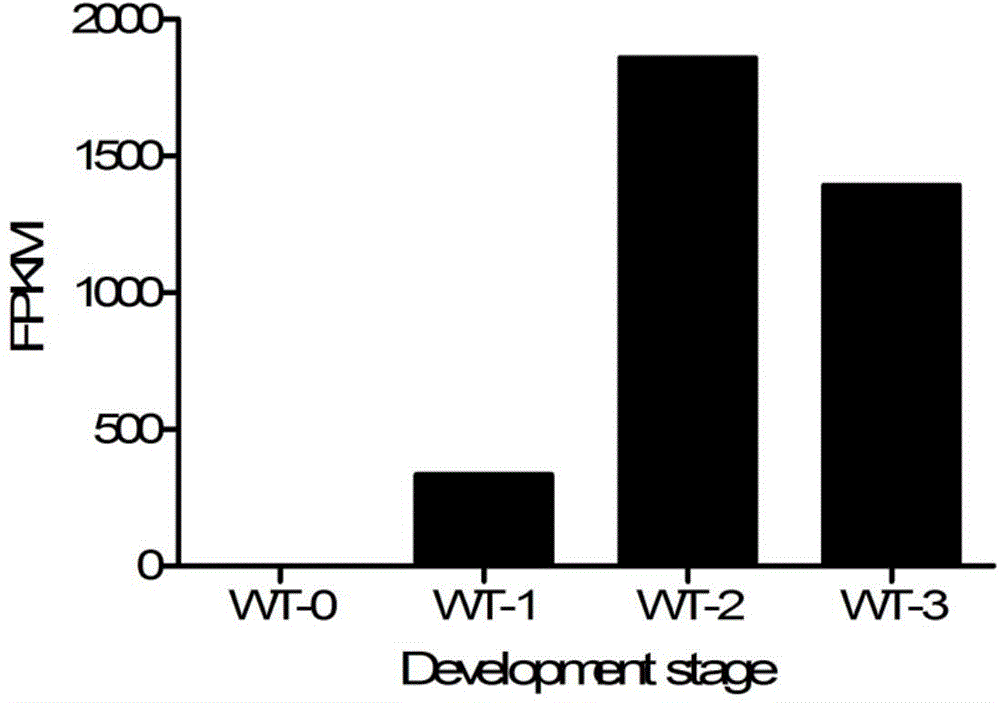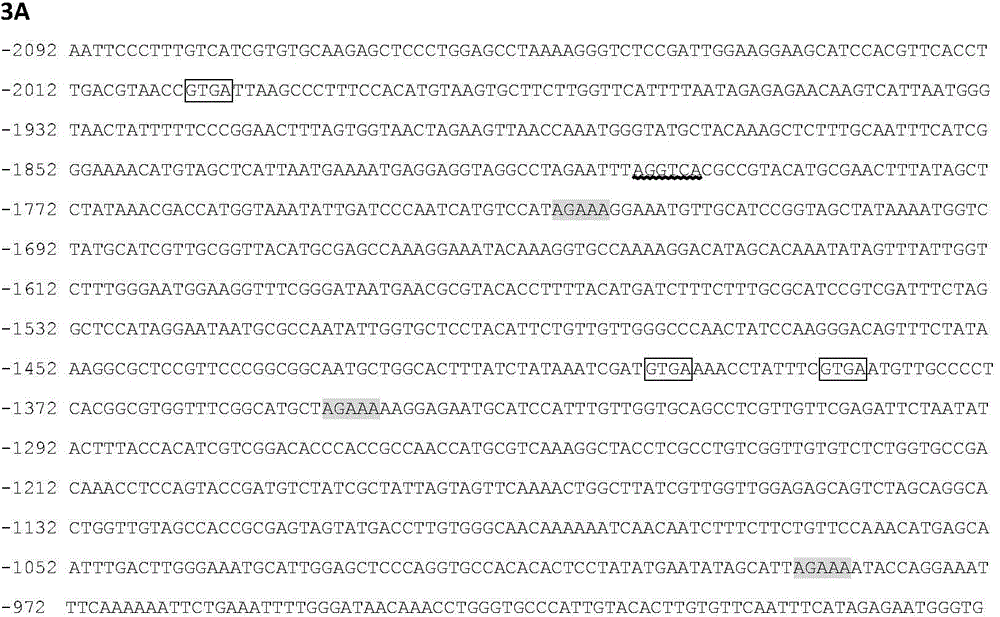Identification and applications of plant anther-specific expression promoter pTaASG033
An anther-specific, promoter-based technology, which is applied to isolated DNA, can solve problems such as long waiting times, effects on plant growth and development, and gene silencing with high homology of promoter sequences.
- Summary
- Abstract
- Description
- Claims
- Application Information
AI Technical Summary
Problems solved by technology
Method used
Image
Examples
Embodiment 1
[0042] Example 1. Genome-wide expression profiling analysis of wheat anthers at different developmental stages and acquisition of anther expression contigs at later stages of pollen development
[0043] Wheat anthers with pollen at meiotic, mononucleate, binucleate and trinucleate stages were taken, and total RNA was extracted with Trizol (Invitrogen) and treated with DNaseI (Promega) to purify mRNA (Ambion). The purified mRNA was reverse transcribed (Invitrogen), interrupted by ultrasound (Fisher), library preparation (illumina) and amplified (illumina), and finally the sequencing reaction was performed on the illumina machine.
[0044] The results of high-throughput sequencing of the wheat transcriptome were first spliced by Trinity software, and the obtained spliced sequences were further removed from redundancy and similarity clustering. For the analysis of expression changes of transcript contigs obtained by splicing, the sequences of high-throughput sequencing in eac...
Embodiment 2
[0046] Example 2. RT-PCR to verify the tissue expression specificity of TaASG033 gene
[0047] Wheat is an allohexaploid consisting of three sets of genomes A, B and D. The average number of copies of genes is 2.8, of which nearly half of the genes (46%) have 3-4 copies, and 12% of the genes have 1 -2 copies, 42% of genes have ≥5 copies. Starting from the sequence of comp163920_c0_seq1 (as shown in SEQ ID NO: 1), using the sequencing information of common wheat published by CerealsDB and IWGSC (International Wheat Genome Sequencing Consortium), and the wheat ancestor Triticum urartu published in Nature in 2013 , A genome donor) and Aegilops tauschii (Aegilops tauschii, D genome donor) were electronically cloned, and three TaASG033 genes were obtained, named TaASG033-1, TaASG033-2 and TaASG033-3, among which comp163920_c0_seq1 Corresponding to TaASG033-1. The cDNA sequences of the three TaASG033 genes are shown in SEQ ID NO: 2, SEQ ID NO: 3 and SEQ ID NO: 4, respectively, and ...
Embodiment 3
[0057] Example 3. Acquisition of TaASG033-1, TaASG033-2 and TaASG033-3 gene promoter sequences and analysis of cis-elements
[0058] Starting from the cDNA sequences of TaASG033-1, TaASG033-2 and TaASG033-3 genes, using the sequencing information of common wheat published by CerealsDB and IWGSC (International Wheat Genome Sequencing Consortium), and the wheat ancestor Urartu wheat published in Nature in 2013 ( The sequencing information of Triticum urartu, A genome donor) and Aegilops tauschii (D genome donor) were electronically cloned, and the promoters of TaASG033-1, TaASG033-2 and TaASG033-3 genes were obtained and named as TaASG033, respectively. -1 promoter, TaASG033-2 promoter and TaASG033-3 promoter, their lengths are 2092bp, 1997bp and 2000bp respectively, and their sequences are shown in SEQ ID NO:5, SEQ ID NO:6 and SEQ ID NO:7 respectively.
[0059] Using the PlantCARE database and the PLACE database, cis-element analysis was performed on the TaASG033-1 promoter, th...
PUM
 Login to View More
Login to View More Abstract
Description
Claims
Application Information
 Login to View More
Login to View More - R&D
- Intellectual Property
- Life Sciences
- Materials
- Tech Scout
- Unparalleled Data Quality
- Higher Quality Content
- 60% Fewer Hallucinations
Browse by: Latest US Patents, China's latest patents, Technical Efficacy Thesaurus, Application Domain, Technology Topic, Popular Technical Reports.
© 2025 PatSnap. All rights reserved.Legal|Privacy policy|Modern Slavery Act Transparency Statement|Sitemap|About US| Contact US: help@patsnap.com



